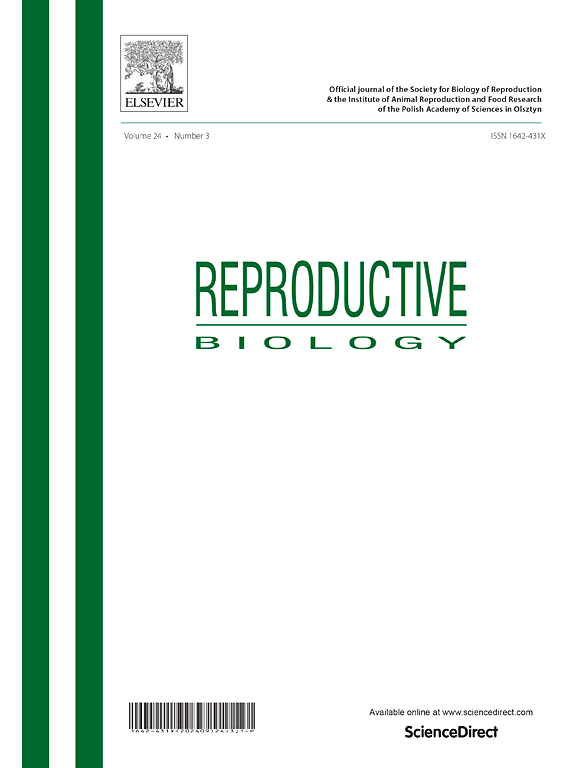Therapeutic potential of diosgenin against methotrexate-induced testicular damage in the rat
IF 2.5
3区 生物学
Q3 REPRODUCTIVE BIOLOGY
引用次数: 0
Abstract
This study evaluated diosgenin effects on methotrexate-induced testicular injury in the rats. A single dose of methotrexate (MTX) (20 mg/kg, i.p) was administered, followed by two weeks of diosgenin treatment via gavage starting one day before methotrexate injection. Testicular damage was evaluated through histological examination of seminiferous tubules, as well as analysis of serum testosterone level, oxidative stress and inflammation biomarkers, and antioxidant levels. The results of this study showed that in the MTX-exposed group, oxidative stress indices of malondialdehyde (MDA), reactive oxygen species (ROS), nitrite and indices of inflammation consisting of tumor necrosis factor α (TNFα), and interleukin 6 (IL-6) have a significant increase compared to the control group. Additionally, reductions were observed in antioxidant enzymes including superoxide dismutase (SOD), catalase (CAT), and glutathione (GSH). In addition, testosterone level decreased and signs of testicular damage were observed in the MTX group. Conversely, in the group treated with diosgenin alongside MTX at a dosage of 50 mg/kg, there was a significant decrease in oxidative stress markers (MDA, ROS, nitrite) and inflammatory markers (TNFα and IL-6). Moreover, there was a significant increase in the levels of antioxidant enzymes (SOD, CAT, and GSH). Diosgenin appears to have the potential to protect testicular tissue from damage caused by the toxic effects of MTX through the reduction of oxidative stress and inflammation.
地奥塞宁对甲氨蝶呤引起的大鼠睾丸损伤的治疗潜力
本研究评估了薯蓣皂苷对甲氨蝶呤引起的大鼠睾丸损伤的影响。研究人员给大鼠注射了单剂量甲氨蝶呤(MTX)(20 毫克/千克,静脉注射),然后从注射甲氨蝶呤的前一天开始灌胃服用地奥司宁两周。通过对生精小管进行组织学检查,以及分析血清睾酮水平、氧化应激和炎症生物标志物以及抗氧化剂水平,对睾丸损伤进行了评估。研究结果表明,与对照组相比,MTX 暴露组的丙二醛(MDA)、活性氧(ROS)、亚硝酸盐等氧化应激指标以及肿瘤坏死因子α(TNFα)和白细胞介素 6(IL-6)等炎症指标均显著增加。此外,还观察到超氧化物歧化酶(SOD)、过氧化氢酶(CAT)和谷胱甘肽(GSH)等抗氧化酶减少。此外,在 MTX 组还观察到睾酮水平下降和睾丸损伤的迹象。相反,在使用地奥司明和 MTX(剂量为 50 毫克/千克)的组中,氧化应激指标(MDA、ROS、亚硝酸盐)和炎症指标(TNFα 和 IL-6)显著下降。此外,抗氧化酶(SOD、CAT 和 GSH)的水平也有明显提高。薯蓣皂苷似乎有可能通过减少氧化应激和炎症来保护睾丸组织免受 MTX 毒性作用的损害。
本文章由计算机程序翻译,如有差异,请以英文原文为准。
求助全文
约1分钟内获得全文
求助全文
来源期刊

Reproductive biology
生物-生殖生物学
CiteScore
3.90
自引率
0.00%
发文量
95
审稿时长
29 days
期刊介绍:
An official journal of the Society for Biology of Reproduction and the Institute of Animal Reproduction and Food Research of Polish Academy of Sciences in Olsztyn, Poland.
Reproductive Biology is an international, peer-reviewed journal covering all aspects of reproduction in vertebrates. The journal invites original research papers, short communications, review articles and commentaries dealing with reproductive physiology, endocrinology, immunology, molecular and cellular biology, receptor studies, animal breeding as well as andrology, embryology, infertility, assisted reproduction and contraception. Papers from both basic and clinical research will be considered.
 求助内容:
求助内容: 应助结果提醒方式:
应助结果提醒方式:


